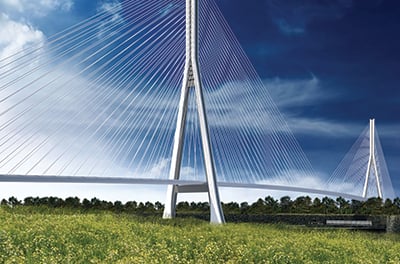PRESS TIME FOR THIS ARTICLE WAS SEPT. 4, 2018
The US Government and its agencies, have long had "Buy America" rules. Exceptions were sometimes made, however. Arguably, these rules have been re-energized by trade talks in Washington and the attendant comments by President Donald Trump. Still, when it comes to Infrastructure, Canadian companies and investors are not entirely running away. There are too many good opportunities to miss without trying, explains Tim Murphy, co-chair of the Infrastructure group at McMillan LLP. “It isn’t one market,” Murphy explains. Clients “look at different regions and ask, would they be more successful in Florida, in Michigan, etc.” They look to the sectors in which there have been successes, wind and solar energy, for instance. And they find a local partner with whom to co-invest and work. “Sometimes it helps to find advisors in the US, ones who can walk through the corridors of power,” says Murphy.
Canada is among the world leaders in Public-Private Partnerships (P3s), and lawyers who act for Canadian project developers or large construction companies on these and other Infrastructure projects say their clients do a significant amount of work on US and cross-border projects. And they watched with trepidation as US President Donald Trump made daunting comments about trade with Canada.
When the US and Mexico reached a trade agreement centred mainly on manufacturing, it must have made Canadian Infrastructure clients even more worried. In late August, the US and Mexico agreed on a 16-year deal — with an option to revisit in six years and extend for another 16 — that would increase the percentage each car that must be made in the US to qualify for duty-free treatment to 75% from 62.5%. The agreement also stipulates that a significant portion of each vehicle made in Mexico be made by workers making at least US$16 an hour.
Even if Canadian and American negotiators manage to reach a deal soon, the details will take months to work out.
Canadian Infrastructure lawyers told Lexpert of the impact of this political context on their clients: “What parties are facing when they look at cross-border Infrastructure projects and what will happen with NAFTA is uncertainty,” says Ella Plotkin, who heads the Infrastructure & Public-Private Partnerships practice group at Fasken Martineau DuMoulin LLP. “That uncertainty is throwing a spanner into the works, it will have an impact on risk transfer and it will have an impact on costing. And it’s all about cost at the end of the day: how do people cost for uncertainty?”
The status of a trade agreement with the US has a significant impact on Canadian companies working on existing projects, Plotkin says.
“People spend tremendous amounts of time costing projects appropriately so they can get the project done within the standards required, make whatever profits that are factored into the process, repay lenders etc. So if you’ve costed on the basis of Product X with no tariffs on it, and suddenly Product X has tariffs on it, your costing has gone out the window, your assumptions are all wrong. There may be very substantial financial implications.
“Mobility of people across the border is another very big issue. Now you can move across the border freely. What might changes to a trade agreement entail? If you’re working on a project on both sides of the border, might you need work permits where you didn’t before? All this uncertainty is a looming sword above people’s heads.”
Another major issue is that trade agreements regulate the government procurement process to ensure signatories have a level playing field, says Judy Wilson, a partner at Blake Cassels & Graydon LLP in Toronto. Changing those rules “becomes a very serious issue.”
“Right now under NAFTA, Canadian and US companies co-operating on a cross-border project are governed by very similar rules. If you throw all that out, one of the things that will have to be rewritten are the procurement rules,” says Wilson. “As a US entity, are you going to be allowed to have a quota on Canadian companies? Is there going to be a prohibition on Canadian companies building? And a critical part of any new procurement rules is who is eligible to bid on them.”
Wilson, who has advised international clients on areas including procurement, project risk management and mitigation strategies, said she believes if NAFTA comes to an end, the repercussions depend on how the Canadian government responds, “if at all.”
If the response is retaliatory, she says, there is a potentially grave impact on Canadian companies’ ability to do work in the US. On procurement, “it could be very interesting on companies like Bombardier, for example, which has been very active in selling trains to the US as part of Infrastructure projects. NAFTA has been very hands-on in regulating the rules with respect to transit.”
Bombardier, like many large Canadian construction companies, has offices in the US which might protect it from any NAFTA fallout.
A taste of changes to the 25-year-old trade agreement is already being felt on Infrastructure projects with the imposition of US tariffs on Canadian aluminum and steel. Many pundits say President Trump is using the tariffs to extract concessions in the NAFTA talks.
“Steel and aluminum is a significant input cost to a lot of infrastructure projects,” says Murphy. “You’ve got their tariffs and retaliatory tariffs, so obviously they’ve got an impact on pricing your deals. The question becomes who takes that risk. I can tell you that a lot of people are digging into their existing P3 contracts right now to figure out what the definition is of ‘change in law.’”
Murphy notes President Trump’s government is pushing for significant protection for US-government procurement, “basically buy America, hire America, right”?
“To the extent there is Canadian-sourced material or Canadian-sourced bidders, what he’s seeking to do is abolish the stipulation that NAFTA signatories have to get the same treatment when it comes to government procurement,” says Murphy. “That would obviously be a big problem for any Canadian company that wants to take its P3 expertise south of the border.”
He points to the Gordie Howe International Bridge joining Windsor, Ontario, and Detroit. Canada is paying for the new bridge and will make its money back in tolls on the Canadian side. In consideration, former US president Barack Obama granted the project a “Buy American” waiver allowing the iron and steel used on the project to come from either the US or Canada.
The US owner of the rival 90-year-old Ambassador Bridge, who is also building a new six-lane span, has complained bitterly about the 2013 waiver. There have been calls for President Trump to revoke it and to require all the materials for the Canadian-funded bridge be produced in the US.
“As NAFTA continues to bubble away, you’ll get all kinds of domestic interests in the rise,” Murphy predicts. “You’re going to get increasing protectionism, increasing use of the fight over NAFTA to fend off Canadian bidders, Canadian suppliers, Canadian projects.”
Speculatively, post-NAFTA, any move to shut Canadian companies out of future US infrastructure projects would likely come in the form of stepped-up US requirements.”
He cites possible heightened prerequisites for certain kinds of security clearances, stipulations that foreign companies hire a much greater percentage of Americans, or certifications that the projects have a very high percentage of US content.
Gregory Southam, a partner at Davies Ward Phillips & Vineberg LLP in Toronto, says whatever a new agreement looks like, it is “100% for sure” going to have an impact not just on raw materials, but also on supply chains for products such as tolling equipment, signalling systems and equipment and rail cars.
He, like others, says the uncertainty is driving up costs for projects that have already been started. The question is who along the chain — the procuring authority such as a local government, the project company or the general construction company that is contracted for the project — is going to have to bear the risk.
Southam, who worked on four US projects and eight in Canada over the summer, says while the general agreements on Infrastructure projects all have a change-of-law clause, they are very specific to the project and might well not be covered by changes in tariffs that affect a wide scope of industries and companies. “My guess is the type of changes we’re talking about with NAFTA and so on would not give rise to compensation.”
He says he believes the construction companies that have been sub-contracted by the project company to do the work “would be the ones eating it, because they do it for a fixed price.”
Southam says at the end of the day, there were already rules governing local content and hiring practices under NAFTA and “I don’t see those requirements getting any easier on foreign companies under the current administration. They’ll probably get harder if you look at President Trump’s base.”
He points to a proposed new high-speed rail line linking Seattle, Portland and Vancouver, which could cost as much as US$42 billion. “If this were to come about under the current administration, would the current administration issue a presidential waiver [on the Buy American sourcing of US steel and aluminum] similar to the Gordie Howe bridge? If you were a betting person, you might say no.”
Even in a tougher trade regime, however, he doesn’t believe the new rules will be so draconian as to completely exclude foreign bidders and expertise on Infrastructure projects, saying they are so large and expensive the US still needs Canada and other countries to step up.
Canadian clients, as Murphy says, will keep at it. Where there is a will, there will be a way across the border.





